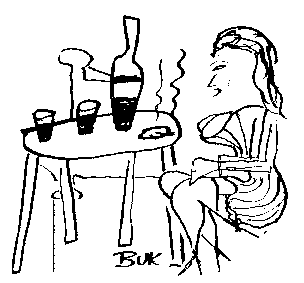
Beats | Home | Links | Moondog | Nico

Charles Bukowski is not a beat writer but he is an interesting comparison point. Originally born in Germany, his family moved to Los Angeles. His father was in and out of work and took this out on his young son. "Ham on Rye" describes the horrors of mowing the lawn where the penalty for not cutting the grass to a uniform length was a beating.
To make things worse, in adolescence, he was affected by disfiguring facial boils which spread to his shoulders and required drilling. From an early age he began to hang around bars but seems to have had a precocious talent for writing.
Probably on account of a certain shyness, coupled with his appearance and drinking, he did not lose his virginity until the age of 24. For years his only women were usually prostitutes or drunks like him. Later, amazingly, he married a millionairess - see timeline - but it did not last. When he became successful he made up for lost time by screwing as many "admirers" as he could. This is documented in "Women" which is inclined to be repetitive as a result. Actually, half the time he is too drunk to perform.Once he left home, around about the time Kerouac was joining the merchant marine, Bukowski started to drift from city to city through a string of bars and dead end jobs. Unlike Kerouac, he was not searching for some ultimate high (nirvana). Bukowski just seemed unconcerned beyond the moment though appearances are always deceptive because he kept on writing.He shared, with Kerouac, a taste for drinking. His writing is soaked in it. Unlike Kerouac, he survived and continued to remain prodigiously creative right up to his death from pneumonia as a result of leukemia.
It is impossible to trace the whole of Bukowski's work. He produced volumes of poetry, much of it very good. He is most famous for three books "Post Office", "Factotum" and "Women". These are exaggerated disguised autobiographies in which the main character, Henry Chinaski, is Bukowski. "Ham on Rye" deals with his childhood and adolescence.